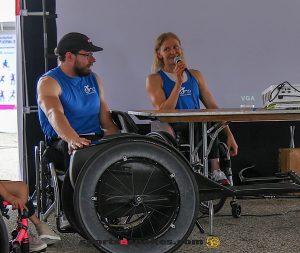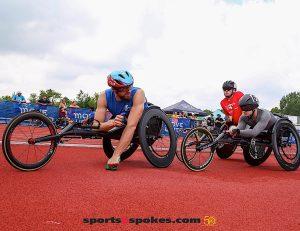Young Wheelchair Racers Learn the Art of Drafting at Hartford Nationals
The opening day of The Hartford Nationals brought more than just competition to Grand Rapids, Mich., this week. Paralympic champions Daniel Romanchuk and Susannah Scaroni led an innovative drafting clinic that introduced young wheelchair racers to one of the sport’s most crucial tactical skills.

The clinic was organized through Romanchuk’s nonprofit Wheels for Change, Inc., and was limited to advanced athletes ages 14 and older with 800-meter times under 3 minutes. For Scaroni, it marked her first active involvement with the organization and a significant milestone in youth wheelchair racing development.
What impressed Scaroni most was the technical proficiency displayed by the select group of young athletes. The clinic, which many anticipated might result in a “long dangling line” of struggling participants, instead showcased a tight, cohesive group maintaining proper drafting formation throughout the session.
“The speeds that we were going in our drafting clinic, the fact that we were able to successfully do a drafting clinic on the first morning is just amazing to me,” Scaroni says. “I had concerns, but it really went off smoothly, which tells me that we’ve got so many good young kids and tells me the future’s really bright.”
The athletes, which numbered near 30, demonstrated remarkable respect for one another and attention to detail, staying close enough to benefit from the draft while maintaining safety.
“I didn’t have to say ‘get closer’ very often,” Scaroni says. “The athletes had a lot of respect for one another. They wanted to make sure they were putting their teammates there on time. They’re strong, so they were really able to be closer.”
For Scaroni, who was just 10 years old at her first Nationals, the clinic represented an opportunity she wished she’d had during her own development. While she was fortunate to train with other wheelchair racers through ParaSport Spokane, she didn’t receive formal drafting instruction until reaching the collegiate level.

“I was okay being behind someone, but I wasn’t really effectively behind them,” she says. “To teach kids how to do it at this age, I think looking back, I would have really benefited from that to get some higher speeds in my distance races.”
The clinic provided young athletes with practical skills they can implement immediately, both in competition and training.
“We’re giving them really important skills that can benefit them here at Nationals, but things they can think about in practice, things that their parents and coaches can also learn,” Scaroni says.
The drafting clinic kicks off a three-day educational program designed to elevate the technical foundation of American wheelchair racing. Saturday’s session focuses on start mechanics, addressing what Scaroni calls “a really important skill in every single race.”
Sunday’s program will feature hands-on experience with various roller trainers, allowing athletes to test different equipment options and receive stroke technique feedback.
“Rollers are a really good resource for athletes, especially if they train alone,” Scaroni says. “There’s a bunch of different kinds of rollers out there, and knowing what to get is hard.”
The Wheels for Change, Inc., clinic also addresses the expanded equipment options available to today’s young racers.
“We have a lot of glove options now compared to when I was a kid,” Scaroni says. “Giving them a chance here at Nationals with guided support to try different things out is a cool opportunity.”
The success of the opening clinic reinforced Scaroni’s optimism about the future of American wheelchair racing. The combination of technical instruction, equipment education and hands-on experience represents a comprehensive approach to athlete development that goes far beyond traditional competition-focused training.
“By the time they’re old, like me, I think we’re going to see just an amazing class of wheelchair racing in the adult division,” Scaroni predicts after watching the advanced young athletes who just mastered their first formal drafting session.

As The Hartford Nationals continue throughout the weekend, the impact of this educational initiative extends beyond the immediate competition, potentially shaping the next generation of Paralympic champions who will have learned these crucial skills at precisely the right moment in their development.
For more information, visit Wheels For Change, Inc. online.